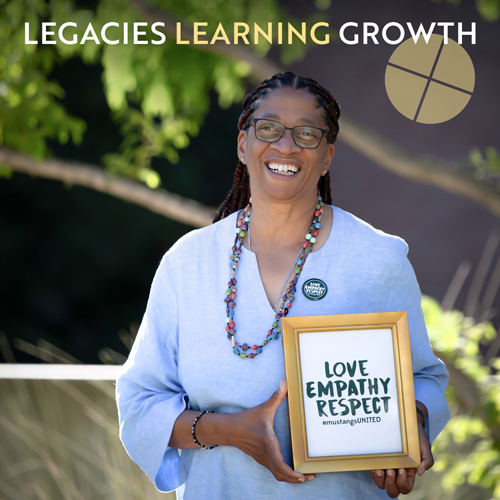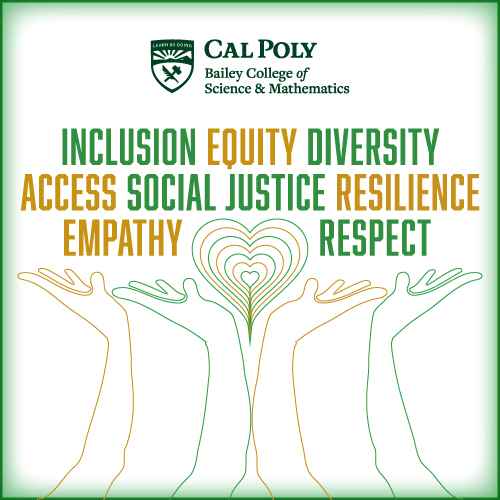The Fierce and Caring Heart of Camille O'Bryant
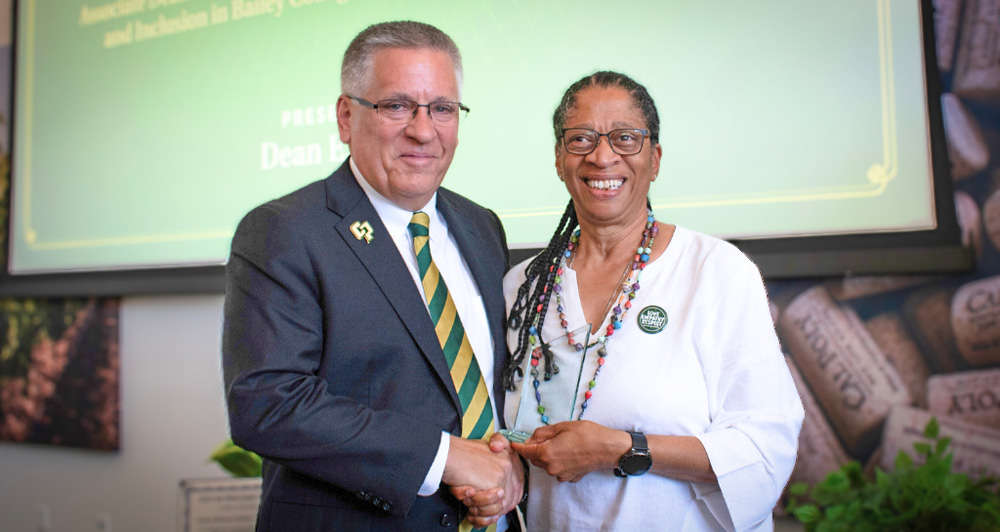 Camille O'Bryant (right) with Cal Poly President Jeffrey D. Armstrong at the 2025 President's Diversity Awards ceremony. O'Bryant received a lengthy standing ovation along with her award. Photo by Sarah Dinetz
Camille O'Bryant (right) with Cal Poly President Jeffrey D. Armstrong at the 2025 President's Diversity Awards ceremony. O'Bryant received a lengthy standing ovation along with her award. Photo by Sarah Dinetz
A PROFILE OF PASSION, RESILIENCE AND IMPACT FOR THIS ICON IN THE BAILEY COLLEGE AND AT CAL POLY
Read this article in Spanish.
Lea este artículo en español.
OCTOBER 2025
by NICK WILSON
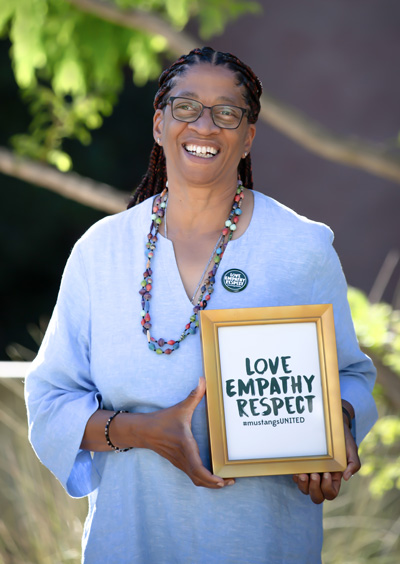
Camille O'Bryant holds a framed version of the motto for the "Love,
Empathy, Respect" campaign she helped launch at Cal Poly in 2017.
Strolling across campus at the end of a long day filled with back-to-back meetings, Camille O’Bryant doesn’t go far before running into familiar faces.
A student who has struggled in math greets her shyly. A faculty member excitedly shares an update about a campus health initiative. A Cal Poly basketball coach jokes about sports while giving a shout-out to her hometown Boston Celtics.
O’Bryant’s voice, joyful and resonant, echoes through the University Union. After exchanging pleasantries, she heads off for the evening, singing cheerful melodies to herself.
Camille O’Bryant started her career teaching kinesiology in 1999 and later took on leadership roles, including becoming the first Black department chair and associate dean in the (Bailey) College of Science and Mathematics
She is recognized as a connector, the glue that bonds people and programs, and for uplifting others and fostering strength through community during tough times.
O’Bryant retired Sept. 1, as the associate dean for student success and welfare and issues of diversity and inclusion advocating for a welcoming campus environment for all.
“Camille received the Cal Poly Martin Luther King Legacy Award in 2019, the same night Cornel West was visiting Cal Poly, and when he asked about her, I told him, ‘Camille is a walking heart,” said Denise Isom, interim vice president for diversity and inclusion. “Everyone she meets, every student who walks into her office, receives all of her to address any need, problem, or question. Camille has been a gift to every individual in her department, her college and to the entire university.”
Colleagues across campus say O’Bryant exemplifies the “Love, Empathy and Respect” campaign that she launched with mathematics Professor Stan Yoshinobu in response to anonymous, hateful messages in flyers and graffiti around campus in 2016-2017.
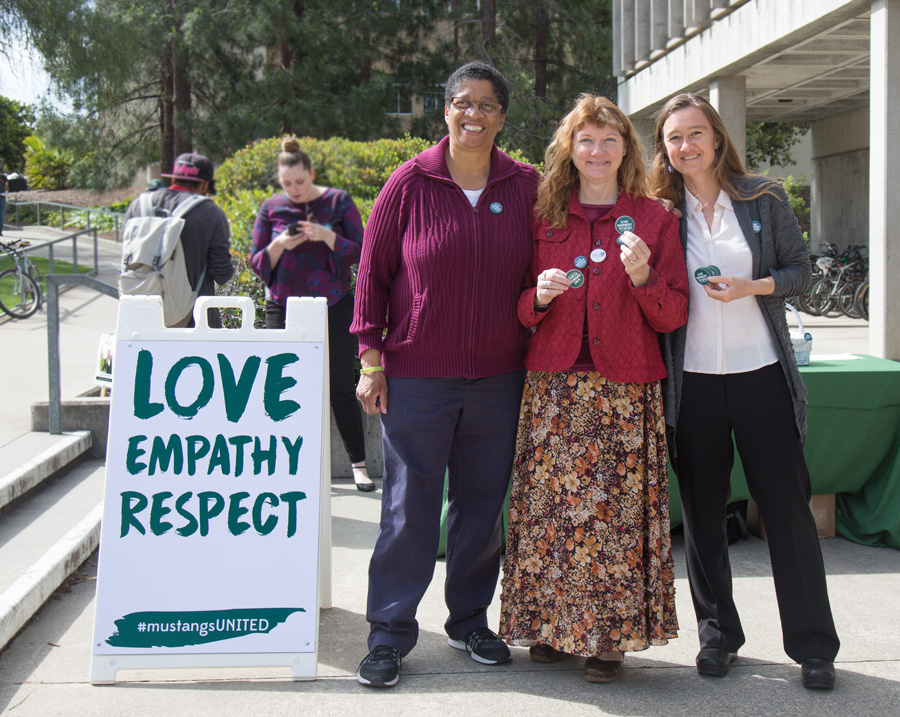
O'Bryant (left) with colleagues at a Mustang United event in 2018.
Courtesy photo
"Camille is a walking heart.Everyone she meets, every student who walks into her office, receives all of her to address any need, problem or question.
~Denise Isom
Cal Poly Interim Vice President for Diversity and Inclusion
A #mustangsUNITED movement caught on with “Love, Empathy and Respect” buttons, magnets, stickers and other materials, effectively drowning out hateful speech and becoming a refrain for inclusion and acceptance.
“Diversity, equity, and inclusion have always been a part of who I am in my professional journey,” O’Bryant said. “I moved into this work because I was being harassed and discriminated against in my sports. There will always be flashpoints. How we respond by creating a community of respect and acceptance is immensely significant.”
O’Bryant understands what exclusion and discrimination feels like. As a youth swimmer, she remembers hearing comments that Black people couldn’t swim. As a swim coach in adulthood, O’Bryant was once told to leave the pool deck at an age group swim meet.
“Camille has taught us that empathy is a practice, and that having an intention requires deep listening, trust, and a desire to understand people,” said Dean Wendt, dean of the Bailey College. “She also shows us that the world treats everyone differently based on appearances, expressions and who they love. And that’s really important to understand to be successful.”
Career Journey
O’Bryant’s influence is now widely recognized across campus, but she faced unexpected challenges in the early years of her time on campus.
Not long after she left The Ohio State University for her new teaching role at Cal Poly, her mother was diagnosed with cancer back home in Boston. To add to her stress, she also faced frosty and hostile responses from some peers during department meetings over curriculum decisions, especially when attempting to emphasize the importance of teaching about inequities and discrimination in sports and media culture, and the need to make the orientation course mandatory for all students in the undergraduate program.
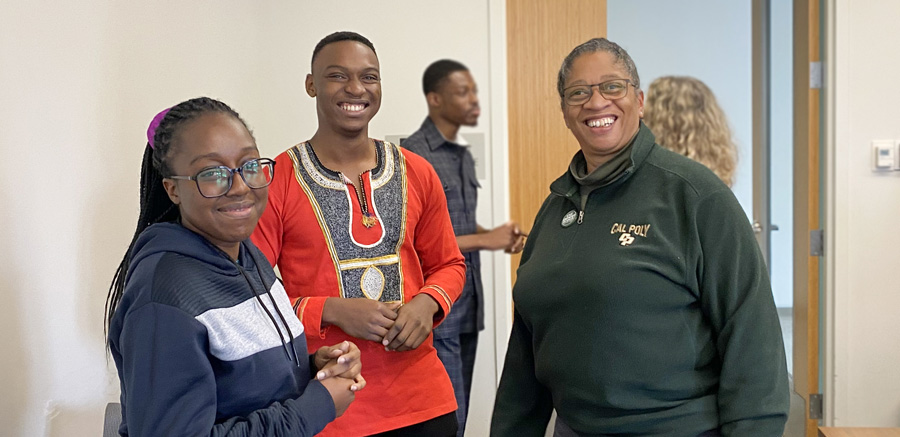 O'Bryant (front right) with exchange students from Ghana, Ropa Nhanga (front left) and Allen Lamtey Kpentey (front middle) at a welcome gathering in 2023. Photo by Izzy Kelly
O'Bryant (front right) with exchange students from Ghana, Ropa Nhanga (front left) and Allen Lamtey Kpentey (front middle) at a welcome gathering in 2023. Photo by Izzy Kelly
“Some of my faculty colleagues were explicitly rude,” O’Bryant said. “I could never say they were doing that because I was a woman, or because I’m a Black woman. But as a Black woman, being on the receiving end of that was hard. It really hurt my feelings, and it chipped away at my confidence.”
She discussed the matter with Phil Bailey, the college’s dean at the time, and helped mediate a meeting between her and some of the faculty who were being most explicitly rude and disrespectful.
“We had a conversation where I felt like I could speak openly without fear of reprisal,” O’Bryant said. “Dean Bailey told them they needed to understand the power dynamics, as they were full professors and I didn’t have tenure. I received an apology.”
But dismissive and critical comments were admittedly hurtful to the point that O’Bryant decided to leave Cal Poly. O’Bryant was offered a faculty position at The University of Tennessee in 2003-2004 after four years in San Luis Obispo.
“I was grateful for allies at Cal Poly and across the country, but I was tired of being the only one having to fight for pieces of the curriculum I felt should be required of all the students,” O’Bryant said.
In Knoxville, she connected with other faculty whose work aligned with her academic interests. But within months she realized she missed Cal Poly students’ dedication to education and their passion for learning, and decided to return to San Luis Obispo.
“Coming back, I decided that instead of letting things happen to me, I could be less of a shrinking violet and learn more about how this campus works and just get out of my head a little bit and follow my heart,” O’Bryant said.
Back at Cal Poly, she formed connections and gained allies across campus and joined the Status of Women Committee. She also joined the Black Faculty and Staff Association.
“My mom's health stabilized, and my personal and professional life balanced out,” O’Bryant said. “I think expanding my network across campus really helped me not feel too overwhelmed.”
She successfully developed two general education courses, one titled Sport and Gender and another titled Sports, Media and American Popular Culture. “It took a couple of tries and multiple visits in front of the committees for them to say, ‘Yes, this is general education,’” O’Bryant said.
Her work eventually led to more peer support, advancement and leadership opportunities. Now, O’Bryant is a mentor and supporter of faculty and students across campus, many of whom credit O’Bryant for helping them thrive.
At her retirement celebration in June, shortly after O’Bryant received the President’s Diversity Award, in a room full of colleagues, family, and campus leaders, Phil Bailey said: “Camille, I’m so glad you came to Cal Poly. And a lot of people here might not know this, but I’m glad you came back.
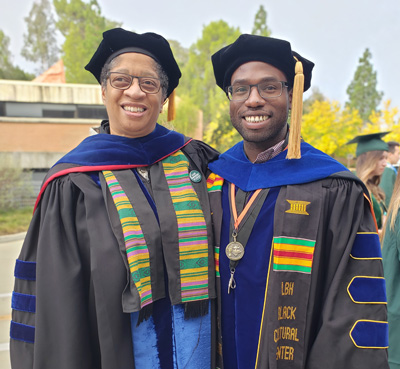
O'Bryant (left) with Jafra Thomas, a kinesiology and public health
professor, at a commencement ceremony.
Courtesy photo
Statistics Professor Immanuel Williams said O’Bryant provides a sense of safety “to create an environment where people like me can feel instantly at ease and protected, as if I could confide in her like an aunt who always had my back.”
“Her advice has made a lasting difference,” Williams said. “Once I felt so exhausted from teaching that I thought I was done. She listened carefully and helped me to distinguish the idea of being burnt out versus being fatigued. That simple reframing gave me the strength to finish a grueling quarter. Once it was over, I knew she was right — I was just fatigued, not burnt out.”
Academic Success
This fall, O’Bryant started the Faculty Early Retirement Program (FERP) as a professor in the Department of Kinesiology and Public Health. Upon her return to the classroom, she'll bring with her a richer understanding of how to help students thrive and survive.
For the past decade as associate dean, O’Bryan's role has involved leadership in academic advising, student health and wellbeing, diversity, equity, and various inclusion efforts, as well as liaison roles with offices and committees.
That has meant helping students in jeopardy of losing academic standing. Many have faced major trauma, including sexual assault, poverty, emotional instability, fear of deportation and impostor syndrome.
Some students lacked adequate study habits needed for success, which worsened mental health challenges. O’Bryant evaluated grades, connected students with resources, and collaborated with students, faculty and staff to follow up.
"Oftentimes it’s like a jigsaw puzzle, and I worked with the students themselves and others to see how we could put the parts together to help them be good students, but more importantly, become healthy humans,” O’Bryant said.
Biochemistry major Zac Giles struggled academically and personally when he arrived at Cal Poly 2017, causing him to leave campus for a five-year hiatus, before regaining admission and resuming his biochemistry pursuit this fall. He credits O’Bryant for her commitment, connection to resources and persistent support throughout his educational journey.
“Camille is like an angel,” Giles said. “When you’re in a situation where you’re struggling, you’re going to have your guard up naturally. With her, you immediately drop your guard. There’s nothing to hide. That was a huge help. There’s something about her enthusiasm and energy that makes you feel like she is your number one cheerleader.”
O’Bryant remembered a different student who was frequently upset and worried he would fail his classes and not succeed professionally if he didn’t graduate. He would go through an entire box of Kleenex in one sitting.
“The interim Dean of Students (David Groom) and I were on speed dial, and between the two of us, the student kept going back and forth,” O’Bryant said. “There were things this student needed to learn how to deal with, and he showed a lot of growth."
Over time, the student learned to manage his emotions and mood swings better, work with others productively, and earned his bachelor’s degree.
“Camille has an intrinsic ability to identify and validate each student’s unique experiences and strengths,” said Ryan Lau, a Bailey College student affairs analyst. “She empowers and uplifts everyone she is in contact with and relates to each of us in such an authentic way.”
Lau said O’Bryant carefully evaluated student grades each quarter and led college academic advisors in discussions, prioritizing student well-being: “Whether the student needs to consider time off, take classes elsewhere, or work on strategies to reduce their courseload and all that is on their plate, Camille is the ever-present advocate and cheerer on of each student’s unique chosen path.”
“Camille’s persistence in helping students succeed is truly remarkable,” Phil Bailey said. “She made it her mission to do everything possible to empower students so they believed in themselves because she believed in them. She was absolutely committed. Camille became an important part of their lives.”
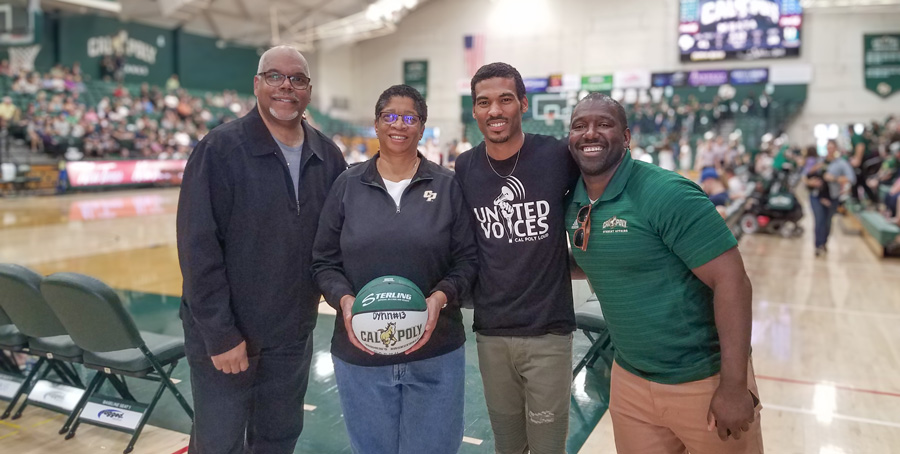 From left: Preston Allen, Emeritus Assistant Vice President for Student Affairs and Executive Director of Housing; O'Bryant; Bryan Hubain, former Cross Cultural Centers Director; and Steve Ross, former Black Academic Excellence Center Coordinator in 2018. Courtesy photo
From left: Preston Allen, Emeritus Assistant Vice President for Student Affairs and Executive Director of Housing; O'Bryant; Bryan Hubain, former Cross Cultural Centers Director; and Steve Ross, former Black Academic Excellence Center Coordinator in 2018. Courtesy photo
Camille O'Bryant's Call to Action: "It’s wonderful to see the individual and collective efforts that students, faculty and staff are engaged in to create a more inclusive and equitable college. Visit the Bailey College Diversity website for more details."




